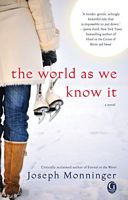
 Joseph Monninger, twice a recipient of a National Endowment for the Arts Fellowship, is also the author of ETERNAL ON THE WATER. Currently a college professor, he has published award-winning fiction and nonfiction. He lives with his family in a converted barn near New Hampshire’s Baker River. Here he talks about the Christmas he observed with his family when he was 18 --- his mother's last.
Joseph Monninger, twice a recipient of a National Endowment for the Arts Fellowship, is also the author of ETERNAL ON THE WATER. Currently a college professor, he has published award-winning fiction and nonfiction. He lives with his family in a converted barn near New Hampshire’s Baker River. Here he talks about the Christmas he observed with his family when he was 18 --- his mother's last.
The day after my mother’s last Christmas, she sank into a coma and never regained consciousness. She died two weeks later on a cold January day with her family, seven children, her husband, a dear neighbor, and a visiting nurse around her bed. When she finally stopped breathing my father, disbelieving, turned to the nurse and asked if that was it. The nurse nodded.
As it happened, my mother’s final Christmas marked my first return from college. I went to Temple University in Philadelphia, not too distant from our New Jersey suburb, but the joy of coming home became magnified by a train trip, the noisy clutter of students traveling, the cold air on passengers’ clothing when they first stepped in the train car. I stood in the bar most of the way, drinking a coffee and feeling rather wonderful. I had plans to go to the high school basketball game the next morning, a nostalgic wallow in my recent accomplishments on the same athletic fields the year before, and I had a sense of coming home a broadened young man. My brother met me at the station, and I remember being satisfied at the smoke hissing up from the bottom of the train, the step down onto gravel, the cold metal handhold pressing through my leather glove as I released it and landed on my native ground.
I knew my mother was sick, of course, but I was 18, filled with my own importance, and, in fairness, not fully aware that my mother was dying. My family thought it best to keep the gravity of the situation from me; they wanted to launch me into college without the nagging guilt I might have experienced at being away from her. The best thing I could do for my mother, they felt, was to have a good experience at college. In hindsight I imagine they were correct, but that did not guard me against the shock I experienced at climbing the familiar steps of my home and stepping into her bedroom. A glance told me all I needed to know. Her bones ran like tent poles under her skin. Blue bottles and Kleenex boxes covered the bedside table.
In a better story than mine, I might have sat and talked and held my mother’s hand. I visited with her, certainly, but not long afterward I borrowed my dad’s car keys and went out to see my high school buddies. The next day I went to the basketball game. The wind blew cold and the leaves had long before left the trees. The gym pressed on us enough heat to make us uncomfortable in our sweaters. I sat in the stands watching the game, my stomach, like an hourglass, aware of sand running through it from one globe to the next. I did not linger after the game.
My sisters, older than I, cooked Christmas dinner. At two we gathered around the table. My brother Chuck and I ascended the stairs, and, because I was young and fit, I carried my mother down the risers to the table. Chuck walked in front of us, bracing me, but my mother’s weight was shocking. The truth that I kept to myself was that she had no weight; she felt little heavier than a card table. I placed her carefully at the head of the table. My sisters folded her bathrobe around her. She did not glitter or smile to see her family. She had another place to go to and we did our best politely to ignore her, as one must ignore a friend fielding a serious phone call from back home. She did not lift her fork. Conversation went on around her. We passed the wine. The turkey slid onto our plates.
She did not make it through the meal. When I offered to take her upstairs, she told me no, she wanted to stay downstairs for a while, so I carried her to the couch in the living room. She rested beside the fire while we concluded the meal. Afterward we carried drinks and dessert to join her. But the fire had begun to puff back and we could not chance the smoke getting in her lungs. I carried her back upstairs. She thanked me for being her horse.
I sat with her a little while then. She asked me about school and about my dorm and I told her what I thought would please her. My eyes could not reconcile this tired, ill woman with the Irish mother who had raised me. Her voice was a whisper. She had begun to go away.
After her death my brothers told me that when I played in my first college football game earlier that fall she had listened on the radio. I was no star, and I would quit playing the next year, but my brothers said she had listened at the top of the steps. And when I had thrown a touchdown pass, probably the last of my career, she raised herself a little off the step and pumped her fist in gladness. Sickness waited in the room behind her, but she had a moment of triumph through her son, through the knowledge that her boy was launched safely from her home, that the last of her babies had found his way.


